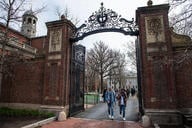You have /5 articles left.
Sign up for a free account or log in.
Buttocks. Some flesh. At least two pairs of legs.
And a student who took pictures of what appears to be a steamy sex act, taking place against a window in a dormitory, clearly visible to any passersby.
Those ingredients are brewing some heated debate over First Amendment protection at the University of Pennsylvania as some recall a 1993 “water buffalo” incident that many thought taught the university to stay away from regulating free expression.
The photographer, an engineering junior, posted the pictures several weeks ago on his password-protected university Web site, which eventually garnered attention at CollegeHumor.com. The pictures are also now widely circulating at Penn.
On Wednesday, Andrew Geier, a psychology graduate student who has served as the photographer’s adviser to the Office of Student Conduct, said that the student has received memos indicating his actions violated Penn’s code of student conduct, sexual harassment policy and policy on acceptable uses of electronic resources. In addition, the documents labeled one of the photographed students an “injured party” who felt “serious distress,” with the situation causing “an intimidating living environment for her.” The photographed students are not identifiable.
The documents, signed by Michele A. Goldfarb, director of the office, indicated that as punishment, the student would face disciplinary probation until graduation and be forced to write essays on conduct and letters of apology to the students he photographed. Organizations conducting background checks on the student in the future would also be able to find out that he had been punished.
In his two years of working with the Office of Student Conduct and helping to advise students in approximately 10 cases, Geier said he’s never seen “punishments that are so outlandish.” An assistant with the Office of Student Conduct said Wednesday that it is office policy not to comment on ongoing investigations.
The student photographer -- who has not admitted to any wrongdoing -- remained anonymous as of Wednesday. Several people who could have identified him, including Geier, chose not to do so. Geier said, “I want the kid to resume a normal existence as soon as possible -- I want what’s best for him.”
Some faculty members have been judicious in their assessments. “I think that what the photographer did was obnoxious, but it was his right to do it,” said Edwin Baker, a law professor at the university. “And the university should leave him alone.”
Others are amazed that administrators have not reflected on the university’s history in regard to free speech, recalling the case of Eden Jacobowitz -- now a lawyer -- who in 1993 was a freshman at the University of Pennsylvania. That year, as detailed in The Shadow University: The Betrayal of Liberty on America's Campuses, Jacobowitz was doing homework when he was disturbed by some loud individuals outside of his dorm. As the noise grew louder, Jacobowitz shouted out of his window, “Shut up, you water buffalo. If you want a party, there’s a zoo a mile from here.”
The noisemakers happened to be members of a black sorority. Within weeks, Jacobowitz was facing charges of racial harassment and his case quickly became a cause célèbre for critics of speech codes in higher education.
In Jacobowitz's case, Alan Charles Kors, a professor of history at the university and co-author of The Shadow University, successfully helped the student defend himself. Ultimately, in September 1993, the executive committee of the university’s Board of Trustees passed a resolution that guaranteed policies that supported the fundamental importance of freedom of speech and expression for students, explained Kors Wednesday.
University administrators, Kors said, did not want to give the perception “that students at Delaware Community College had more First Amendment rights than University of Pennsylvania students.”
On Wednesday, hoping to head off another “water buffalo” situation and to draw attention back to the 1993 resolution that would appear to vindicate the photographer, Kors became a player in the latest case centered on student freedom at the university by officially becoming an adviser to the student.
“This whole situation was settled back in the early 1990s,” he said. “If administrators pursue this, they will make a fool of a great institution. They will have shown an incredible failure to protect the liberty of students at the University of Pennsylvania.
“If they didn’t want pictures taken of them,” asked Kors, “why didn’t they just close the blinds?”
Students have reacted to the current situation largely with incredulity. “It is ludicrous to mar someone’s legal background check because they took a picture of some people in public, even if it was a mean sort of picture to take,” offered Acacia Parks, a psychology graduate student, in the feedback section of The Daily Pennsylvanian. “There are photographers who make their whole living taking pictures of celebrities doing things in public places that celebrities would rather other people don't see. Is that lame? Yes. Is it illegal? Hell, no.”
A meeting is planned for later this week between all parties to discuss potential resolutions to the situation, according to a university spokeswoman.




